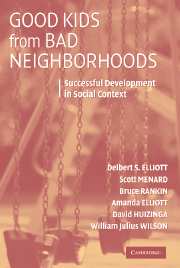Book contents
- Frontmatter
- Contents
- List of Tables and Figures
- Foreword by Richard Jessor
- Acknowledgments
- 1 Growing Up in Disadvantaged Neighborhoods
- 2 Growing Up in Denver and Chicago: The MacArthur Neighborhood Study
- 3 Good and Bad Neighborhoods for Raising Children
- 4 The Effects of Growing Up in a Bad Neighborhood: Initial Findings
- 5 Critical Dimensions of Neighborhood Organization and Culture
- 6 The Effects of Neighborhood Organization and Culture
- 7 Family Influences: Managing Disadvantage and Promoting Success
- 8 School Climate and Types of Peer Groups
- 9 What Matters Most for Successful Youth Development?
- 10 Successful Development in Disadvantaged Neighborhoods
- Appendix A
- Appendix B
- References
- Author Index
- Subject Index
- References
Foreword by Richard Jessor
Published online by Cambridge University Press: 06 August 2009
- Frontmatter
- Contents
- List of Tables and Figures
- Foreword by Richard Jessor
- Acknowledgments
- 1 Growing Up in Disadvantaged Neighborhoods
- 2 Growing Up in Denver and Chicago: The MacArthur Neighborhood Study
- 3 Good and Bad Neighborhoods for Raising Children
- 4 The Effects of Growing Up in a Bad Neighborhood: Initial Findings
- 5 Critical Dimensions of Neighborhood Organization and Culture
- 6 The Effects of Neighborhood Organization and Culture
- 7 Family Influences: Managing Disadvantage and Promoting Success
- 8 School Climate and Types of Peer Groups
- 9 What Matters Most for Successful Youth Development?
- 10 Successful Development in Disadvantaged Neighborhoods
- Appendix A
- Appendix B
- References
- Author Index
- Subject Index
- References
Summary
The last several decades have witnessed a pervasive transformation in the organization of knowledge and the process of social inquiry. In salutary contrast to their traditional – and parochial – preoccupation with disciplinary concerns, the social sciences have increasingly begun to take complex social problems as the starting point in their confrontation with the empirical world. Indeed, with regard to a particular discipline, that of sociology, Neil Smelser expressed doubt not long ago that this name would denote an identifiable field in the future, and he predicted that “scientific and scholarly activity will not be disciplinary in character but will, instead, chase problems” (1991, pp. 128–29). In the same vein, the prestigious Kellogg Commission noted pointedly that “… society has problems; universities have departments” (1997, p. 747). It is largely from the focus on complex problems of concern to society that whole new fields of knowledge have emerged in recent decades – among them behavioral science – and that transdisciplinary perspectives have, of logical necessity, come to inform and shape empirical inquiry. This volume by Elliott and colleagues exemplifies these recent developments and beautifully instantiates the transdisciplinary perspective of contemporary behavioral science.
Reflecting these trends, and self-consciously committed to furthering them, the MacArthur Foundation Research Network on Successful Adolescent Development in High-Risk Settings undertook a large-scale and extended program of collaborative, transdisciplinary research.
- Type
- Chapter
- Information
- Good Kids from Bad NeighborhoodsSuccessful Development in Social Context, pp. x - xviPublisher: Cambridge University PressPrint publication year: 2006



